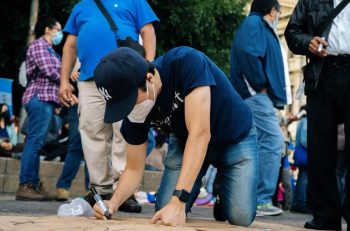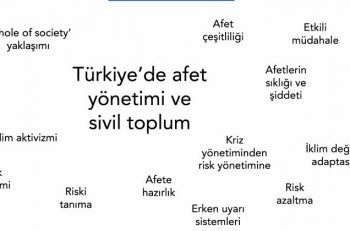Dialogue and Cooperation in the Civil Sphere

While the representatives of civil society agree that dialogue and cooperation in the civil sphere is not sufficient, it is noted that organizations in the field of women and ecology carry out more effective practices in this sense.
This analysis, which was prepared within the scope of the Future of Civil Society project, was prepared in order to reveal the current situation of civil society, especially in terms of dialogue and cooperation, the reasons for the problems experienced and the approaches to their solution. According to the data obtained from the interviews, academic publications, and field observations in the qualitative part of the Civil Society Needs and Motivation Research, although dialogue and cooperation in the civil field is considered insufficient, important steps are taken in this regard.
In the evaluations, it is observed that civil society actors find the dialogue and cooperation among themselves insufficient. Some of the reasons for this inadequacy are structural problems stemming from civil society, it is recorded that it is formed by the current political environment and polarization. The research conducted by the YADA Foundation in 2005 reveals that the thematic and ideological closures, which are among the obstacles to dialogue and cooperation, are still felt in the civil sphere.
It is stated that the culture of cooperation, solidarity, and volunteerism that Turkish society has carried from history and tradition to the present is one of the essential elements that nourish the dialogue and cooperation of non-governmental organizations. It is also complained that the lack of dialogue is not limited to the ‘other’, and that there is insufficient dialogue and cooperation between non-governmental organizations that share the same line of thought and operate for the same purpose.
The following factors regarding the barriers to dialogue and cooperation are taken into consideration in the evaluations:
- It is stated that in a medium where the struggle area is wide and the need is high, a small number of volunteers are exhausted from running around to catch up with every problem, they work mostly to save the day and survive, so they cannot look up to see who is around.
- It is stated that every organization focuses on its own project, and that the few human resources are barely sufficient for this reason, because of the pressure climate created by the ‘Let me protect my own organization first’ reflex.
- It is noted that non-governmental organizations are clustered in metropolitan cities, communication and relations with the locals are weak, non-governmental organizations in metropolitan cities such as Istanbul, Ankara and Izmir do not produce inclusive studies with local organizations, and the relationship is limited to certain institutions.
- It is complained that the fund acts competitively in sharing influence and reputation, abstaining from making up for each other’s deficiencies, strengthening their weaknesses, and sharing knowledge and experience.
- In platforms where different non-governmental organizations come together, it is emphasized that each organization focuses on making its own ‘propaganda’, only tells about its successes, does not express its deficiencies or weaknesses and does not request support.
- It is stated that ‘others’ are approached negatively with an ‘unjust attitude’, and stereotypes are acted on instead of understanding perspectives other than themselves and negotiating ideas. It is said that those who are generous in criticizing others become stingy in self-criticism.
- Again, as a result of political and social polarization, civil society is segmented and polarized as close to or in opposition to the government. It is stated that the number of NGOs speaking to all segments is gradually decreasing. It is complained that it is not possible to come together in terms of being a non-governmental organization and defending the freedoms of civil society.
- Even if thematic collaborations take place from time to time, it is said that these collaborations turn into ghettoization after a while.
Good Practices for Collaboration: Women’s Rights and Ecology
It is noted that non-governmental organizations working especially on women’s rights and environmental issues are in stronger solidarity. Organizations such as the Eşik Platform, Denge ve Denetleme Ağı, İvme Movement, Afet Platformu (Disaster Platform), the Volunteering Committee, GoFor (Gençlik Örgütleri Forumu), Türkiye Çevre Platformu (Turkish Environment Platform), No Pesticides On My Plate Civil Society Network, and the Right to Clean Air are shown as good examples in the field of cooperation. In evaluations, it is emphasized that civil society needs stronger relations within itself in order to create policy, enrich policy content, influence decision mechanisms and society. The following are the solution suggestions made by civil society representatives, academia, and opinion leaders regarding what needs to be done for effective dialogue and cooperation:
- Managements of non-governmental organizations should be more sharing and more open to cooperation. They should be able to collaborate more. The mentality of ‘Let it be mine, let it be small’ should be avoided.
- Civil society should not lose its autonomy, it should protect its independence in its relations with politics and public, act in accordance with the principles of transparency and accountability
- New cooperation models at the point of both human and material resources for the problems at the source point should be created and should be open to support and solidarity on these issues.
- We should show more effort to listen and understand each other; joint symposiums, panels and workshops should be organized for this purpose.
- In order to transform the experience in the field into cumulative cooperation, while developing a project, previous studies on the subject should be researched, the outputs produced should be utilized and the missing points should be focused.
As a result, keeping the channels of dialogue open and interacting with the society, the public and other organizations will strengthen the civil society by establishing mutual trust. Solidarity and dialogue will ensure unity and cooperation. In this sense, the importance of establishing networks that transcend political, geographical, and sectoral borders both in order to benefit from the know-how and experience of other organizations and to maintain independence becomes evident.












Bizi Takip Edin